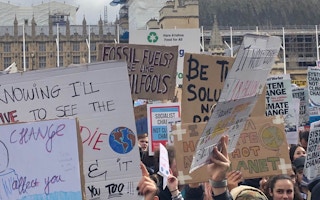As thousands of students across Britain traded their pencils for protest signs on Friday, calling for governments to step up action on climate change, young people said they wanted a bigger say in decisions that would shape their future.
Joining youth around the world as they skipped class to highlight the urgency of global warming, school children packed the streets of London, some accompanied by their parents.
As they passed sites of political importance—from Parliament Square to Downing Street to Buckingham Palace— they banged pots and pans, and brandished banners with messages including, “Save us and we’ll go back to class”, urging the officials inside to respond.
Cyrus Jarvis, 15, a London-based organiser for the UK Student Climate Network, one of the groups leading the movement in Britain, said its demands included lowering the legal voting age to 16 from 18.
“We want a voice when it comes to making decisions, versus the older generations—who just don’t care—making decisions for us,” he said. “For climate action, we don’t think the government is doing enough.”
“
If they don’t listen to us and meet the demands we are asking for, if they start ignoring us, we will step up our game and we will do more to get their attention.
Cyrus Jarvis, 15, organiser for the UK Student Climate Network
Another key ask was for climate change education to be added to the school curriculum, he said.
“We need to do something now. If we don’t, we don’t have a future,” he added.
Going global
Under the leadership of Greta Thunberg, the 16-year-old from Sweden who has largely been credited with sparking the youth movement—and has been nominated for a Nobel Peace Prize for her efforts—students in Europe and Australia have been protesting in favour of climate action for months.
But Friday marked the first time that students in more than 100 countries around the world united in a coordinated action.
Some, like Jarvis, said it showed the movement was gaining momentum.
“It’s not just one country—we’re all telling governments what we think,” he said.
“If they don’t listen to us and meet the demands we are asking for, if they start ignoring us, we will step up our game and we will do more to get their attention.”
The global strike came on the heels of a new UN study warning that devastating temperature rise in the Arctic may now be inevitable.
It also followed a report from the UN climate science panel last October telling countries they would suffer more severe damage if they did not make a rapid shift onto a green path to limit temperature rise to 1.5 degrees Celsius above pre-industrial times, a goal they agreed to strive for in 2015.
Education
Along with several friends, Cara Consiglio, 15, from east London, said she was participating in the strike because climate change had not received as much attention as it should from leaders.
“It’s a big issue, and the more we push it to the side, the worse it’s going to get,” she said.
Though she had made environmentally-friendly changes to her personal life after doing research, like going vegan to reduce her carbon footprint, Consiglio said she wanted her education to include more on climate change-related issues, and how young people could respond.
“Even if we had a few lessons a week about what we could do to make a difference personally, that would be so helpful,” she told the Thomson Reuters Foundation.
Cathy Rogers, 50, of west London, who was demonstrating with her two children, Mako, five, and Sorrel, 11, said the family had been inspired to get involved by the words of Thunberg.
Echoing Thunberg’s now-viral speech at the World Economic Forum in January, when she told world leaders she wanted them “to panic” and enact climate policies, Mako waved a sign emblazoned with the Swedish activist’s words: “(The) house is on fire!”
Parents onside
Rogers said many children were taking individual action like turning off lights and recycling, but felt that was not enough.
“They’re now saying … we need the adults to take more responsibility,” she added.
She also acknowledged teachers had been put in a difficult position by the strike, with some in London threatening disciplinary action against absent students.
At her own children’s school, concerned parents and pupils alike had made an effort to raise awareness by doing things like showing a video of Thunberg’s Davos speech.
“That was a chance for the older kids to see that someone not that much older than them is having this incredible influence around the world, which is really amazing and inspiring,” Rogers added.
This story was published with permission from Thomson Reuters Foundation, the charitable arm of Thomson Reuters, that covers humanitarian news, climate change, women’s and LGBT+ rights, human trafficking and property rights. Visit http://news.trust.org/climate.








